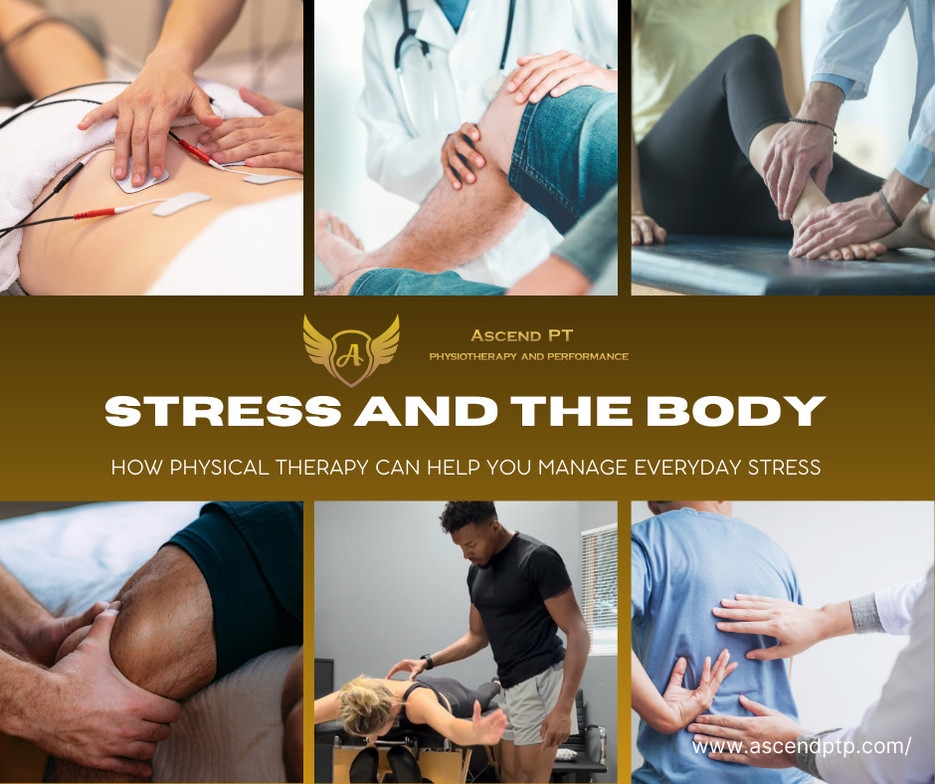
Introduction
In today's fast-paced world, stress has become a nearly ubiquitous part of everyday life. Whether it's work pressures, family responsibilities, or simply trying to keep up with the demands of modern living, stress can take a significant toll on both your mental and physical health. But what many people don't realize is that stress doesn't just affect your mind—it manifests in your body in various ways, leading to a host of physical symptoms that can diminish your quality of life. At Ascend PT Physiotherapy and Performance, we believe that understanding the connection between stress and physical health is crucial for effective stress management. In this blog, we'll explore how stress impacts the body and how physical therapy, including techniques like dry needling, massage, and tailored exercise plans, can help you manage and alleviate these physical symptoms.
Understanding Stress and Its Physical Manifestations
What Is Stress?Stress is the body's natural response to perceived threats or challenges. When you encounter a stressful situation, your body triggers a "fight or flight" response, releasing stress hormones like cortisol and adrenaline. These hormones prepare your body to either face the challenge or flee from it, leading to a series of physical changes, such as increased heart rate, heightened alertness, and tense muscles.
While this response can be beneficial in short bursts, helping you deal with immediate threats, chronic stress—where your body remains in a state of heightened alertness for extended periods—can have detrimental effects on your health.
How Stress Manifests in the Body
Chronic stress doesn't just affect your mind; it has a profound impact on your physical health as well. Here are some common ways stress manifests in the body:
1. Muscle Tension and Pain
One of the most common physical symptoms of stress is muscle tension. When you're stressed, your muscles tighten, particularly in areas like the neck, shoulders, and back. Over time, this constant tension can lead to chronic pain, stiffness, and even headaches.
2. Fatigue and Low Energy
Chronic stress can deplete your energy levels, leaving you feeling constantly tired and fatigued. This is often a result of the body's stress response consuming more energy than usual, leaving you with less energy for other activities.
3. Digestive Issues
Stress can disrupt your digestive system, leading to symptoms such as stomach pain, bloating, diarrhea, or constipation. This is because stress can interfere with the normal functioning of the digestive system, slowing down or speeding up digestion.
4. Sleep Problems
Stress can make it difficult to fall asleep or stay asleep, leading to poor sleep quality and insomnia. This creates a vicious cycle, as lack of sleep can further exacerbate stress and its physical symptoms.
5. Headaches and Migraines
Tension headaches and migraines are common in people experiencing chronic stress. These headaches are often triggered by muscle tension and can be debilitating, making it difficult to focus on daily tasks.
6. Weakened Immune System
Chronic stress can weaken your immune system, making you more susceptible to infections and illnesses. This is because stress hormones can suppress the immune response, reducing your body's ability to fight off pathogens.
How Physical Therapy Can Help Alleviate Stress-Related Symptoms
Physical therapy is a highly effective way to manage the physical symptoms of stress. By addressing the root causes of stress-related tension and discomfort, physical therapy can help restore balance to your body and promote overall wellbeing. At Ascend PT Physiotherapy and Performance, we offer a range of therapies designed to alleviate the physical impact of stress, including dry needling, massage, and tailored exercise plans.
1. Dry Needling for Muscle Tension and Pain Relief
Dry needling is a therapeutic technique that involves inserting thin needles into trigger points—tight, knotted areas of muscle that are often a result of chronic stress. Unlike acupuncture, which is based on traditional Chinese medicine, dry needling is rooted in Western medical principles and focuses on relieving muscle pain and tension.
How Dry Needling Helps:
- Releasing Tension: By targeting trigger points, dry needling helps release muscle tension, reducing pain and discomfort in areas like the neck, shoulders, and back.
- Improving Blood Flow: The insertion of needles stimulates blood flow to the affected area, promoting healing and reducing inflammation.
- Restoring Mobility: By alleviating muscle tightness, dry needling can help restore mobility and flexibility, allowing you to move more freely and with less pain.
At Ascend PT Physiotherapy and Performance, our experienced therapists use dry needling as part of a comprehensive treatment plan to address the physical symptoms of stress. Whether you're dealing with chronic muscle tension or acute pain, dry needling can provide significant relief.
2. Massage Therapy for Relaxation and Stress Reduction
Massage therapy is a time-honored technique for reducing stress and promoting relaxation. By applying pressure to muscles and soft tissues, massage helps release tension, improve circulation, and calm the nervous system.
Benefits of Massage Therapy:
- Relieving Muscle Tension: Massage helps to loosen tight muscles, reduce stiffness, and alleviate pain, particularly in areas prone to stress-related tension like the neck and shoulders.
- Promoting Relaxation: The rhythmic, soothing motions of massage therapy activate the parasympathetic nervous system, which counteracts the stress response and promotes relaxation.
- Enhancing Circulation: Massage increases blood flow to muscles and tissues, delivering oxygen and nutrients that promote healing and reduce inflammation.
- Improving Sleep: By reducing stress and promoting relaxation, massage therapy can also improve sleep quality, helping you to feel more rested and rejuvenated.
At Ascend PT Physiotherapy and Performance, we offer customized massage therapy sessions tailored to your specific needs. Whether you're looking to alleviate muscle tension, reduce stress, or simply relax, our skilled therapists are here to help.
3. Tailored Exercise Plans for Stress Management
Regular physical activity is one of the most effective ways to manage stress and improve overall health. Exercise helps to release endorphins—natural chemicals in the brain that act as painkillers and mood elevators—while also reducing levels of stress hormones like cortisol.
How Exercise Helps Manage Stress:
- Releasing Endorphins: Physical activity triggers the release of endorphins, which help improve mood, reduce pain, and create a sense of wellbeing.
- Reducing Muscle Tension: Exercise helps to stretch and strengthen muscles, reducing tension and preventing the build-up of stress-related stiffness.
- Improving Sleep: Regular exercise can improve sleep quality by helping to regulate your circadian rhythm and reduce the time it takes to fall asleep.
- Boosting Energy Levels: While stress can drain your energy, regular exercise can boost your energy levels by improving circulation and oxygen delivery to tissues.
At Ascend PT Physiotherapy and Performance, we create personalized exercise plans that are tailored to your individual needs and goals. Whether you're new to exercise or looking to enhance your current routine, our physiotherapists will work with you to develop a plan that helps you manage stress, improve your physical health, and enhance your overall quality of life.
4. Breathing and Relaxation Techniques
Breathing exercises and relaxation techniques are simple yet powerful tools for managing stress. By focusing on your breath and practicing relaxation techniques, you can calm your nervous system, reduce stress, and promote a sense of peace and tranquility.
Benefits of Breathing and Relaxation Techniques:
- Calming the Nervous System: Deep breathing activates the parasympathetic nervous system, which counteracts the stress response and promotes relaxation.
- Reducing Anxiety: Focusing on your breath can help reduce anxiety and bring your mind into the present moment, reducing the impact of stressors.
- Improving Focus and Clarity: Relaxation techniques help clear your mind, improve focus, and enhance mental clarity, making it easier to manage stress and stay productive.
At Ascend PT Physiotherapy and Performance, we incorporate breathing exercises and relaxation techniques into our treatment plans to help you manage stress more effectively. Whether you're dealing with chronic stress or simply looking for ways to relax, these techniques can be a valuable addition to your stress management toolkit.
Conclusion
Stress is an inevitable part of life, but it doesn't have to take a toll on your physical health. By understanding how stress manifests in the body and taking proactive steps to manage it, you can reduce its impact and improve your overall wellbeing.
At Ascend PT Physiotherapy and Performance, we're here to help you navigate the challenges of stress with effective, evidence-based therapies that address both the physical and emotional aspects of stress.
If you're struggling with the physical symptoms of stress, or if you're simply looking for ways to improve your stress management, contact Ascend PT Physiotherapy and Performance today. Our experienced team is dedicated to helping you achieve a healthier, more balanced life through personalized care and expert guidance.
Dr. Alex Samuel
Contact Me

